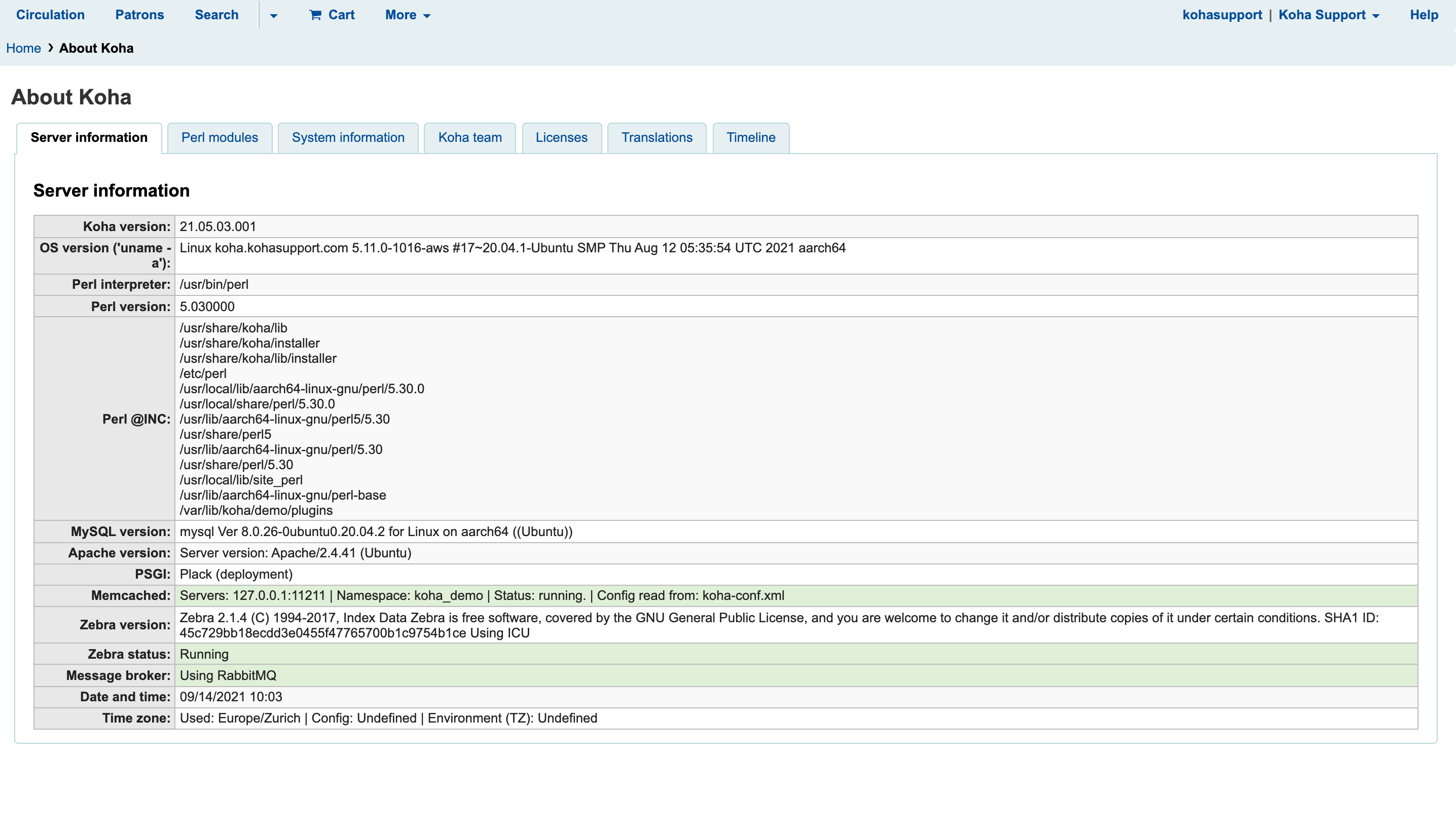Koha Hacks: How to Install Memcached on Koha Library System (Running On Ubuntu 20.04LTS)
Is your Koha server taking too long to catalog or checkout items? Before you break the bank and purchase a bigger server with bucket-loads of RAM and processing power, install Memcached instead – you might just save yourself a lot of time and money!

Koha Hacks: How to Install Memcached on Koha Library System (Running On Ubuntu 20.04LTS)

Is your Koha server taking too long to catalog or checkout items? Before you break the bank and purchase a bigger server with bucket-loads of RAM and processing power, install Memcached instead – you might just save yourself a lot of time and money!
Enable caching with Memcached
Memcached works by storing data in your server’s RAM and serving requests from the memory cache instead of passing on queries to your database server. This speeds up your application (in this case, Koha) and reduces the load on your SQL database. To install Memcached on your Koha server, do the following (remember to backup your data before your start!):
1. Check if Memcached isn’t installed already
ps -A | grep memcached
If you get a response like 537 ? 00:10:52 memcached then Memcached is already installed and you can skip the installation. You can also go to Home > About Koha to check.
2. Install Memcached
sudo apt update
sudo apt upgrade
sudo apt install memcached
3. Configure Memcached in koha-conf.xml
Koha comes with the section for Memcached already configured but sometimes s!@% happens and you have to do it manually. Skip this section if the memcached section is properly configured.
sudo nano /etc/koha/sites/library/koha-conf.xml
where library is the name of your Koha instance. Around line 300 after the <!-- <zebra_loglevels>none,fatal,warn</zebra_loglevels> --> line, you should see the following
<memcached_servers>127.0.0.1:11211</memcached_servers>
<memcached_namespace>koha_library</memcached_namespace>
<template_cache_dir>/var/cache/koha/library/templates</template_cache_dir>
Add these lines if they are missing, replacing ‘library’ with your Koha instance name.
4. Enable and start Memcached
sudo systemctl start memcached.service
5. Check to see that Memcached is running.
Go to Home > About Koha page.
If you configured everything correctly, you should see the following highlighted in green line under Server Information:
Memcached: Servers: 127.0.0.1:11211 | Namespace: koha_demo | Status: running. | Config read from: koha-conf.xml
Tweaking Your Koha Library Server
Pro Tip: You should regularly check Koha’s Home > About Koha page. It gives you a quick overview of your server information. If there are any errors, missing applications or dependencies that might be slowing down your server, they will show up here. Now, read on to find out how to make the most of Koha library system.

Speed is of the essence in today’s world so it’s important you optimize your Koha library system server to ensure your patrons and staff can do their work quickly and efficiently. Let me if installing Memcached made a difference for you in the comments. And if you need help, don’t hesitate to get in touch.
Koha Support provides hassle-free Koha installation and cloud hosting as well as training, data migration, customization and technical support. Check out our packages and start your free trial today!
How To Perform Post-Installation Checks On Koha Library System
Ensure your system is correctly set up and ready for use. This guide will guide you through the steps to perform these checks. Log into your Koha instance. Navigate to the "About" page.. You will see crucial information about your Koha instance, dependencies, and...
How to Complete Koha Library System’s Post-Installation Setup
This guide will help you set up your Koha Library System after launching it on Amazon Web Services (AWS) Marketplace. 1. Retrieve the Koha Administrator Password Log in to your AWS account and navigate to the EC2 dashboard. In the EC2 console, select your new...
How to Install Koha Library System on Ubuntu Server 20.04 LTS
Koha is the most popular open source library management system in the world. Learn how to install Koha on Ubuntu Server 20.04 LTS and join thousands of libraries using Koha around the globe.
7 Reasons Why You Need an Integrated Library Management System
Running a library isn’t as simple and straightforward as many people I have encountered think. It’s more than just checking out books and putting them back on the shelf when they are returned. Librarians have to deal other complex, time-consuming responsibilities like acquisitions, cataloguing, inventory, budgets, reports and interlibrary loaning. Pen and paper won’t cut it, and using an excel spreadsheet is only marginally better than digging a trench using a caviar spoon.
Koha Hacks: How to Install the Koha Offline Circulation Plugin
What do you do if your Koha library system suddenly goes offline due to a server crash, power or internet outage? Go back to the dark ages and start writing with pen and paper? Surely not! Koha has a very useful feature called Offline Circulation which allows you to...
Why Koha May Not Be The Best Library System For You
Here are some potential disadvantages of using Koha ILS: Steep learning curve: Koha can be challenging to set up and customize, especially for those who are not familiar with open-source software or the underlying technology. Lack of commercial support: Koha is a...
What Are The Most Popular Library Systems In The World?
Most popular library systems Libraries are essential for preserving and providing access to information, knowledge, and culture. Library systems help manage the catalog, circulation, and general administration of a library. With the rise of technology, library systems...
Top 10 Courses For Librarians Cost Duration Links
Here are the top 10 best courses or degrees for librarians, along with cost and average duration information and links to some programs: 1. Master of Library Science (MLS) - This is the most common and widely recognized degree for librarians. The average cost of a MLS...
Top 10 Courses For Librarians Cost Duration
Here is the average cost and duration for each of the top 10 courses or degrees for librarians: 1. Master of Library Science (MLS) – The cost varies depending on the institution and location, but on average, the cost is between $15,000 to $35,000. The duration is...
The Top 10 Degrees To Earn For A Successful And Higher Paying Career As A Librarian
1. Master of Library Science (MLS) – This is the most common and traditional degree for librarians, it provides a comprehensive education in library and information science, including cataloging, reference, information technology, and library management. 2. Master of...
[Solved] How to Backup Your Koha Library System MySQL Database
How to backup a MySQL database, including Koha
Koha Hacks: Why You Should Use Content Delivery Network (CDN) For Koha Library System
Is your Koha server taking too long to catalog or checkout items? Before you break the bank and purchase a bigger server with bucket-loads of RAM and processing power, you should try setting up a content delivery network (CDN) using a free service like CloudFlare...
Koha Hacks: How To Enable Apache Caching On A Koha Library System Server (running Ubuntu 20.04LTS)
Is your Koha server taking too long to catalog or checkout items? Before you break the bank and purchase a bigger server with bucket-loads of RAM and processing power, enable Apache caching on your Koha ILS server instead - you might just save yourself a lot of time...




![[Solved] How to Backup Your Koha Library System MySQL Database](https://kohasupport.com/wp-content/uploads/2021/11/kohasupport-koha-is-cloud-based-400x250.webp)

